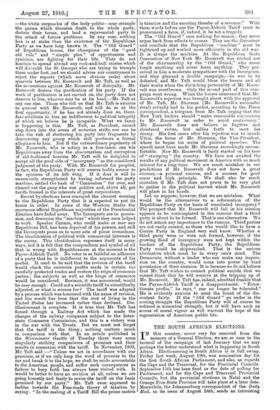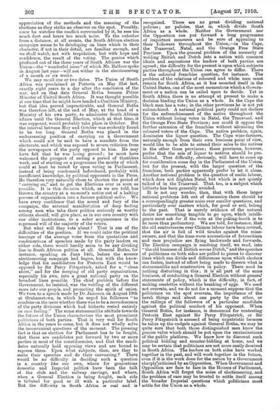THE SOUTH AFRICAN ELECTIONS.
IN this country, never very far removed from the memory of a General Election, we are so near to the turmoil of the campaign of last January that we may perhaps the better understand what is happening in South Africa. Electioneering in South Africa is in ?till swing. Friday last week, August 19th, was nomination day for the first South African Parliament, and also, as regards the Cape and the Transvaal, for the Provincial Councils. September 15th has been fixed as the date of polling for Parliament, and for the Cape and Transvaal Provincial Councils, but the provincial elections in Natal and the Orange Free State Province will take place at a later date. Meanwhile, the Johannesburg correspondent of the Daily Mail, in its issue of August 24th, sends an interesting appreciation of the methods and the meaning of the elections as they strike an observer on the spot. Possibly, since he watches the conflict surrounded by it, he sees too much dust and hears too much noise. To the onlooker from a distance, at all events, the South African election campaign seems to be developing on lines which in their character, if not in their detail, are familiar enough, and we shall watch, not with trepidation, but with hope and confidence, the result of the voting. The genius which produced out of the three years of South African war the Union—the "wonderful issue" of which Mr. Balfour spoke in August last year—will not wither in the electioneering of a month or six weeks.
We may recall one or two dates. The Union of South Africa was proclaimed at Pretoria on May 31st last, exactly eight years to a day after the conclusion of the war, and on that date General Botha became Prime Minister of United South Africa. It was thought possible at one time that he might have headed a Coalition Ministry, but that idea proved impracticable, and General Botha was therefore left, at the end of May, at the head of a Ministry of his own party, to administer South African affairs until the General Election, which at that time, it was supposed, would probably take place in October. But the interval between May and October was evidently found to be too long. General Botha was placed in the embarrassing position of carrying on a Government which could not be said to have a mandate from the electorate, and which was exposed to severe criticism from the newspapers of the party opposed to him. He may have felt that he was losing ground ; he must have welcomed the prospect of ending a period of thankless work, and of starting on a programme the merits of which could at least be tested by open voting in Parliament, instead of being condemned beforehand, probably with insufficient knowledge, by political opponents in the Press. He therefore very naturally chose to shorten the period of "carrying on," and to get the Elections over as soon as possible. It is this decision which, as we are told, has thrown the country at a moment's notice out of a halting process of organisation into a furious political milge. We have every confidence that the sound and fury of the campaign, the external manifestation of deep feeling among men who take their politics seriously as worthy citizens should, will give place, as in our own country with our older institutions, to a, sober acquiescence in the expressed will of the majority of the voters.
But what will they vote about ? That is one of the difficulties of the position. If we could infer the political leanings of the average voter from the quotations and condensations of speeches made by the party leaders on either side, there would hardly seem to be any dividing line in South African politics at all. General Botha, for instance, speaking on June 14th, before the severer electioneering campaign had begun, but with the know- ledge that his candidature for Pretoria East would be opposed by Sir Percy Fitzpatrick, asked for a "clean sheet," and for the merging of old party organisations, especially his own, into a great national party on the broadest lines possible. The chief problem before the Government, he insisted, was the welding of the different races into one people, and promoting the spirit of union. We turn to a speech made by Dr. Jameson on August 19th at Grahamstown, in which he urged his followers "to combine on the issue whether there was to be a recrudescence • of the party divisions which had hitherto rested entirely on race feeling." The same statesmanlike attitude towards the future of the Union characterises the most prominent politicians of both parties. That is very well for South Africa in the years to come, but it does not wholly solve the inconvenient questions of the moment. The pressing fact is that an election for Parliament has to be fought, that there are candidates put forward by two or more parties in most of the constituencies, and that the candi- dates naturally hold opposing views and are bound to express them. Upon what subjects, then, are they to make their speeches and do their canvassing ? There would be no difficulty in deciding such a question in a country like our own, where for generations domestic and Imperial politics have been the talk of the club and the railway carriage, and where, when a General Election is being fought, each side is ticketed for good or ill with a particular label. But the difficulty in South Africa is real and is recognised. There are no great dividing national policies ; no policies, that is, which divide South Africa as a, whole. Neither the Government nor the Opposition can put forward a, long programme of important measures and be sure of appealing to their followers throughout the -Union,—in the Cape, the Transvaal, Natal, and the Orange Free State Province. Upon the general problem of the necessity of welding British and Dutch into a nation with common ideals and aspirations the leaders of both parties are agreed ; the difficulty for the present is upon which subjects parties throughout the Union can agree to differ. There is the coloured franchise question, for instance. The problem of the relations of coloured and white men must remain for South Africa, as it has asserted itself in the United States, one of the most momentous which a Govern- ment or a nation can be called upon to decide. Yet in South Africa there is no attempt at present to make a, decision binding the Union as a whole. In the Cape the black man has a vote; in the other provinces he is not yet enfranchised. A national political party could not declare for the enfranchisement of the native throughout the -Union without losing votes in Natal, the Transvaal, and the Orange Free State Province ; nor could it oppose the further extension of the franchise without alienating the coloured voters of the Cape. The native problem, again, dominates the liquor question. The Cape wine-farmers, naturally enough from their own business point of view, would like to be able to extend their sales to the natives in the other three provinces ; those provinces, however, prefer that the sale of liquor to natives should be pro- hibited. That difficulty, obviously, will have to come up for consideration some day in the Parliament of the Union, but for the present, with the larger question of the franchise, both parties apparently prefer to let it alone. Another national problem is the question of coolie labour, which does not frighten Natal, but which is not quietly talked of in the Transvaal. That, too, is a subject which hitherto has been generally avoided.
It is not any wonder, then, that with these larger national problems left out of discussion there should be a correspondingly greater noise over smaller questions, and particularly over matters which, for good or evil, belong to the past. That is merely evidence of the natural desire for something tangible to go upon, which intelli- gence must ask for if the vote at the polling-booth is to be more than perfunctory. We are told, for instance, that the old controversies over Chinese labour have been revived, that the air is full of wild tirades against the mine- owners, and that the time-worn accusations of favouritism and race prejudice are flying backwards and forwards.
The Election campaign is resolving itself, we read, into "the old business of British versus Dutch," and the speeches of politicians on both sides are pulled to pieces to discover lines which can divide and differences upon which electors can fasten, instead of effort being made to discern what is statesmanlike and constructive in policy. There need be nothing disturbing in this ; it is all part of the same business, of conducting a General Election without general statements of policy, which is the difficulty, in fact, of making omelettes without the breaking of eggs. We need not overrate, and we do not for a moment suppose that the politicians on the spot overrate, the importance of the harsh things said about one party by the other, or the railings of the followers of a particular candidate against the political conduct of his opponent. When General Botha, for instance, is denounced for contesting Pretoria East against Sir Percy Fitzpatrick, or Sir Percy Fitzpatrick is accused of being unpatriotic because he takes up the cudgels against General Botha, we may be quite sure that both those distinguished men know the precise value which should be put upon the recriminations of the public platform. We know how to discount such political bidding and counter-bidding at home, and we may be certain that politicians are not more easily deceived in South Africa. The leaders on both sides have worked together in the past, and will work together in the future, even if it is the work done for the nation by a Government sharply:criticised by an Opposition. When Government and Opposition are face to face in the Houses of Parliament, South Africa will forget the noise of electioneering, and the problem of race may be trusted to settle itself among the broader Imperial questions which politicians must settle for the -Union as a whole.







































 Previous page
Previous page